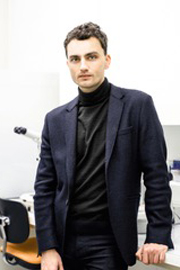 Al Jord Lab
Al Jord Lab
 Quantitative Cell Biology
Quantitative Cell Biology
- Group page
- Research lines
- Group members
- Publications

Al Jord Lab

2023 Group Leader in the Quantitative Cell Biology programme, Center for Genomic Regulation (CRG), Barcelona, Spain.
2022 EMBO New Venture Fellow in Systems Biology at the Department of Molecular Life Sciences, University of Zurich, Switzerland.
2018-2023 Post-Doctoral Fellow at the Center for Interdisciplinary Research in Biology (CIRB), Collège de France, Paris, France.
2012-2017 PhD and Post-Doctoral Fellow at the Biology Institute of Ecole Normale Supérieure, Paris, France.
2011 Pre-PhD Research Scholar at the Ronald O. Perelman Department of Dermatology, New York University (NYU Langone Health), New York City, USA.
Summary
To function, organisms rely on vital organs which, in turn, rely on cell division and specialization. At the subcellular scale, these universal cellular processes are notably driven by robust mechanisms of organelle remodeling. Our lab’s broad interest lies in discovering these mechanisms, which is critical for the fundamental understanding of organisms in health and disease, as well as for enhanced organ engineering strategies.
A prominent research focus is the relation between physical forces and the remodeling of essential nuclear RNA-processing organelles known as biomolecular condensates. We pioneered in revealing that, in germ cells, cytoskeletal forces mechanically remodel and regulate nuclear condensates across scales for reproductive success. Whether somatic cells, which compose the majority of cells in an organism, evolved this mechanical mechanism of organelle remodeling remains a mystery. However, our new evidence indicates that this mechanism is deployed by mammalian somatic cells within diverse physiological and pathological contexts. We therefore aim to venture into these unexplored grounds of nuclear condensate mechano-regulation across somatic cell types in health and disease. The research objective is to decipher how cytoskeletal forces impact nuclear dynamics across scales, from organelle remodeling down to RNA-processing regulation, and how this physical link influences somatic cell division and specialization.
To attain this aim, our research follows a cross-disciplinary approach, bridging methods from systems, cell, molecular, and synthetic biology along with computational and biophysical tools. This comprises techniques like protein multiplexing, advanced live and super-resolution imaging, optogenetics, spatial transcriptomics, biomimetic systems, and force measurement and modulation assays. We will work with different model systems of interest, which include but are not limited to primary mouse brain neural progenitors and multiciliated cells, mouse cell lines (e.g., muscle cells), and human cell lines (e.g., breast cancer cells, iPS cells).
- Organelle remodeling in proliferation & differentiation
- Cytoskeletal & nuclear mechanics & dynamics in health & disease
- Mechanical regulation of biomolecular condensates & RNA-processing
